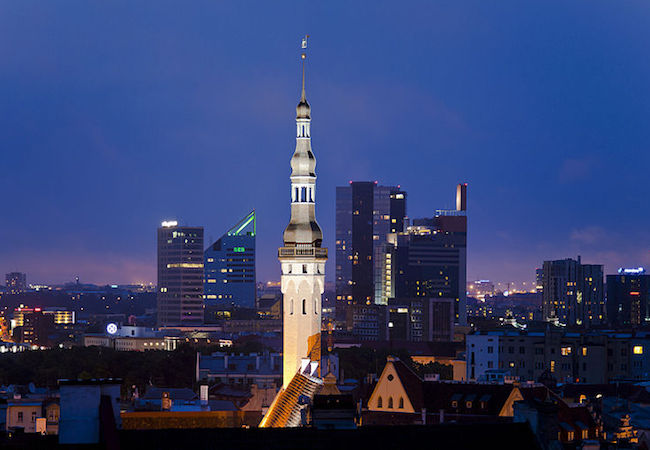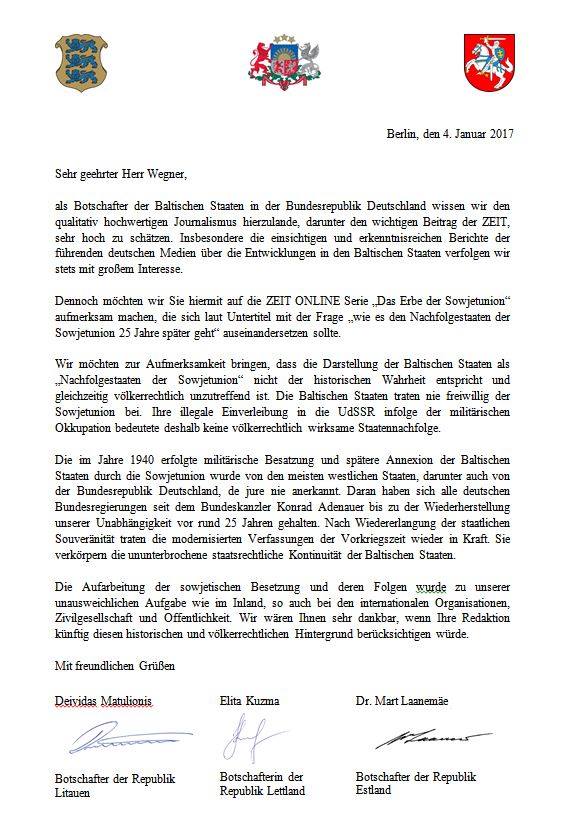
By Rusif Huseynov
In the early days of the current year, the ambassadors of Estonia, Latvia and Lithuania to Germany collectively wrote a petition asking German media to stop referring to the above-mentioned nations as “former Soviet countries”. The issue had been prompted by the Soviet Legacy column on the German news portal Die Zeit.
The Facebook page of Latvia`s embassy in Germany posted an image of the letter co-signed by the Latvian ambassador Elita Kuzma along with her counterparts from Estonia and Lithuania.

In the letter to the German portal, the ambassadors noted that their countries were independent from 1918 until 1940 and did not join the Soviet Union voluntarily but were occupied and annexed, while the majority of Western democracies, including Germany, never recognized the Soviet occupation of the Baltics.
The letter also claims that the Baltic states did not create themselves from nowhere in the early 1990s after the downfall of the USSR but restored their independence that had been severed by the Soviet rule, thus declaring continuity of their statehood. The Baltic states are not successors to the Soviet Union`s statehood and rights and therefore cannot be politically defined as former Soviet republics.
The Lithuanian Foreign Ministry also touched upon the issue by stating that the portal responded to the remark, pledging to stop using the concept inaccurate in terms of international law.
Interestingly, the article from “The Legacy of the Soviet Union”series, to which the ambassadors draw the attention was actually written by Sergejs Potapkins, an opposition member of the Latvian parliament.
According to an Estonian news site, the misnomer, frequent in the German-speaking countries, is regularly used to describe any territory that used to be part of the Soviet Union.
In order to demonstrate the absurdity of referring to the Baltic states as “former Soviet”, a Latvian media agency made fun of different countries by, too, recalling their past: “…The letter [of the ambassadors] was sent in the former Prussian capital, Berlin…News outlets in the former Roman and Norman colony of Great Britain, the former Carolingian territories of the Holy Roman Empire and former Grand Monarchy of France, and the former British and French colonies in North America have also been known to do the same thing.Curiously the tendency is less prevalent in the former Warsaw Pact countries and even in the former Tsarist Empire and former dominions of the Golden Horde to the east of Latvia…”
That was not the first attempt of the Baltic trio to get rid of their Soviet history and legacy that might somehow be extending up to now.
Immediately upon restoring their independence, Estonia, Latvia and Lithuania decided to abandon the Russian sphere of influence and drift towards the West. As a logical result of the relevant processes, all the three countries took part in the 2004 enlargement of NATO and the European Union by becoming full member of both organizations. The EU accession process ran in parallel with that to the NATO. Although the two were not officially linked, one apparently gave additional impetus to the other. For the Baltic states, NATO membership might be even more attractive and vital. Security was justifiably their priority since their entire recent history had been marked by an absence of security. The EU was perceived to be primarily a Single Market and lacking in a security dimension. This was partly because joining the EU appeared to be an eventuality, whereas the Baltics’ NATO membership was not a foregone conclusion since there was strong opposition to it mainly by the Kremlin.
In 2011, Estonia switched to euro. So did Latvia in 2014 and Lithuania in 2015, having completed the Baltics` entering into Eurozone.
Today the three countries are liberal democracies, a fact which indeed pushes them further away from their Soviet heritage and other ex-Soviet countries.
In a parallel process, the three countries strive to build a Nordic identity. This tendency is especially strong in Estonia, which refers to its cultural and historical ties with Sweden, Denmark and Finland; with the titular people of the latter, the Estonians belong to the same language group. In December 1999, then Estonian foreign minister, who would later ascend into presidency, Toomas Hendrik Ilves delivered a speech entitled “Estonia as a Nordic Country” to the Swedish Institute for International Affairs. According to another Estonian politician, Marko Mihkelson, head of Riigikogu`s foreign affairs committee, his country`s belonging to Northern Europe “make(s) perfect sense in geographic and geopolitical terms.”
It is therefore no surprise that the Estonian society has even debated over a change of the flag: from the post-Soviet tricolor to a Scandinavian-style cross design with the same colors. According to the supporters of the proposed version, it would symbolize the country`s links with Nordic countries.

In order to further develop a Nordic brand, Estonian diplomat Eerik-Niiles Kross even suggested modifying the country`s official name in English and several other foreign languages from Estonia to Estland (which is the country`s name in Danish, Dutch, German, Swedish, Norwegian and many other Germanic languages).
Indeed, Estonia, Latvia and Lithuania have been receiving the strongest support from their northern neighbors even prior to their independence. The Nordic countries were the first to open their borders, introducing visa-free regimes with the Baltic countries, facilitated their smooth integration into European and transatlantic institutions. A regional cooperation platform called Nordic Baltic Eight plays an important role in deepening the relationship between the two regions.

While Euroskepticism may today prevail in some EU member-states and the European Union itself has been recently shattered by a wide of range of issues from the Greek crisis to the flood of refugees to the Brexit, leading some pundits to forecast ultimate disintegration of the Union, the Baltic three seem to be ardent supporters of the concept of a united continent. In the light of Donald Trump`s statements on diminishing the American influence in the eastern part of Europe, the Baltic nations that constantly feel the breath of the Russian bear on their necks are haunted by the ghost of the Soviet Union. Especially in this complicated period, when both Russian officials and experts call on reviving the borders of the USSR and, sometimes going even further, of the Russian Empire. Fears were especially intensified after Russia annexed Crimea from Ukraine just like it incorporated the Baltic countries during the WWII and backs the ethnic Russians and Russian-speaking population in the eastern Ukraine nowadays. Accommodating a big portion of Russian minorities, which are accepted as an anachronistic relic of the Soviet past, the Baltic nations, especially Latvia and Estonia have serious reasons to worry.
According to Leonid Bershidsky, the anti-Soviet arguments by the Baltic countries, however, make little sense. Willingly or not, they were part of the USSR. They were subject to its economic planning and migration policies, a history that is far more recent than the colonial past of the U.S. or almost any former part of the British Empire. The Baltic nations` large, often disenfranchised, Russian minorities are a lasting legacy of the Soviet past, with Concord, the party representing the Russian-speaking population in Latvia, winning a plurality of the vote in the last parliamentary election. “Post-Soviet” is not an insult but a statement of fact.Going back even further, Latvia, Lithuania and Estonia spent most of the last two centuries as part of the Russian Empire. Russian military might forced them to gravitate east rather than north, adds L.Bershidsky.
The officials in Russia, the recognized successor-state of the USSR, have, in their turn, repeatedly denied the occupation calling it a voluntary incorporation. According to the Russian viewpoint, no military force was used for the incorporation and it was made by the decrees of the legitimate governments in Baltic states in accordance with international law. Moreover, Russia’s main diplomat, Sergey Lavrov stated in one of his interviews that the USSR had modernized economy and industry in Estonia, Latvia and Lithuania, and made more investment per capita in the Baltic countries than in the other constituent republics of the former Union. It was a response to the claims of Riga, Vilnius and Tallinn to the reimbursement of “the Soviet occupational damage”. Only the compensation to Latvia was first estimated by the Latvians at 185 billion euro, later having been raised to 300 billion euro.
Despite the efforts of the Baltic states, it seems to be tough to get rid of their red past as the Soviet heritage is in the living memory and still continues to exert profound effects on the current situation in the region. However may the Baltic people hate to confess it, both Soviet and post-Soviet thoughts are still influential in their countries. Perhaps when this mindset is finally gone, others may then stop referring to them as former Soviet states.




